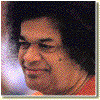Sathya
Sai Education in Human Values Programme

|
Love
- Right Action - Non-Violence -
Truth - Peace
|
One advantage
which will accrue when the moral uplift
programme is taken up in schools is that through
the subtle influence of the children, the
atmosphere in the home is also cleansed. When
the boy or girl sits in silence and meditates on
the Creator and His glory, the parents too will
react in the same manner and the home will be
filled with humility and love.
The Education in
Human Values Programma is intended to draw out
the best in a child and to enable his/her
personality to develop towards perfection. This
process of blossoming human excellence calls for
excellence in each of the five domains or
aspects of human personality. These five
domains, namely, physical, intellectual,
emotional, psychic and spiritual define the
human system in to-to, as a whole.
The five basic
values, namely Truth, Righteous Conduct, Peace,
Love and Non-Violence correspond to the domains
listed above.
Since the human
beings everywhere in the world are alike, each
can aspire to inculcate and internalize these
values. These values, thus are universal and
transcend all distinctions of country, religion,
caste and creed. They embrace all beings, as
their origin lies right within each
individual.

|
Human
Personality and Human Values
|
Note:
Here the location of the all pervasive soul or
life energy is just symbolic.

The life principle
within each of us is the truth. We would not be
existent without it and once we are not there,
the world also ceases. This life principle is
identified as the human soul which in turn is
the 'resident divinity' within each individual.
It is this truth which is the basis of every
other thing and with the power of which the
heart beats, the lungs breath and the system
works. The role of human intellect is to find
out the truth.
Interestingly,
when one realizes and experiences this truth,
one sees that the same truth pervades every
other person and object. And in essence we are
all one.
Truth has
different levels. There is the truth of sense
perception such as: 'the fire burns'. One can
ascertain this with one's senses. There is also
the truth by inference: such as 'man is mortal'.
We base this statement on the strength of our
observation of those around us and extend it to
arrive at a general conclusion, even though we
may not have seen every human being born in this
world dying. Apart from all these is the truth
which is incapable of being destroyed or hurt.
It persists and pervades the whole cosmos.

Truth in action is
Righteous Conduct. The action takes place on the
physical domain and behind each action there is
thought. If this thought derives its sustenace
from the human will, as opposed to human desire,
the resultant action will be righteous.
What is of
significance here is to understand the
distinction between will and desire. Will is the
colourless component of human resolve which
motivates and inspires him to act in accordance
with the truth. Different from this is the
desire that prompts action. More often than not,
this desire springs out from some myopic
assumption or misbelief. The child has to be
encouraged and trained to ignore impulses like
this. In fact, it is the will to succeed which
precedes everything else.
To ensure that
Righteous Conduct becomes a way of life for a
person, the education and training has to start
in the childhood itself. This capability is
developed in a child by some basic training in
some important skills.

Peace
is the end purpose of all human endeavour. Right
or wrong, whatever a man thinks or does is with
the intention of attaining peace and happiness.
Peace
would certainly become a far more attainable
entity, if one were to know the domain of
personality at which it is acquired.
It
is only when there is an emotional equilibrium
that one experiences peace. This equipoise is
not inert or vegetative but a dynamic
realization that the emotional conflict and
upsurge can never withstand the test of Truth
and Righteousness. Peace is a state of 'power
packed stillness' and follows the awareness that
the source of human fulfilment is within.
Often
dubbed as a mirage, peace can be a reality for
each of us if we have faith in our innate power
to do good, to be good and see good.
What
is equally important is to recognize that
nothing in this universe is ever responsible for
absence of peace within us. It is only when our
internal emotional system is disturbed that
restlessness and confusion find a home. By
conscious efforts we can certainly avoid such
lacunae.

"How can one cultivate Prema?
Firstly, consider always the faults of others
however big to be insignificant and secondly,
consider your faults however small to be big
and feel sad and repentant. Whatever you do,
with yourself and others, do it remembering
that God is omnipresent. Endeavour every
moment to be aware of the omnipotence of God."
The
psychic domain of the human system is the source
of love. Love is the expression of the
individual divine within and is the power of
soul. It is the mightiest of forces in the world
and is truly representative of human nature.
Loeve
is not an emotion. It is a form of energy which
each individual transmits and receives every
moment. It affects all forms of life. It is a
peculiar possession which grows with sharing.
Love
is the answer to the question: 'What in me loves
- What in another person'. It is the reflection
of the same Truth that one loves. What to say of
children, even animals and beasts respond to
this power of love. love helps us overcome the
sense of fear by promoting better understanding
and appreciation. Since Love springs from the
Truth, it is in nature of Tighteous Action and
results in peace.
Love
has to begin by manifesting itself towards
parents and grow and gradually to include
family, neighborhood, country and most of all
God.

Non-violence
is the zenith of human achievement and
perfection. It is universal love that goes
beyond our relation with our fellow beings and
embraces all living and non-living things. It is
the spiritual domain of existence. Here, one
experiences the essential oneness and unity of
all creation. It blossoms from the understanding
that man has an obligation towards every object
and component of this universe. And the least
one can do is to try and extend one's sphere of
love to all.
In
the context of human beings, Non-violence means
amity, harmony and the understanding; in the
context of plants and animals it means
non-injury that is, desisting from avoidable
harm in the context of nature as such, it means
non-violation of the law and balance of nature.
Thus
the practice of non-violence is not restricted
to the physical plane alone but includes all the
three, that is, thought word and deed.

|
Approaches
to Education in Human Values
|
"Children
must grow in the awareness of the
brotherhood of men and the fatherhood of
God. If no provision is made for this type
of teaching, then we are denying them their
due. Faith in man involves faith in God and
faith in God generates faith in man."
"Children
should be like a lamp at home. They should
carry the lights outside. They should become
street lights serving as an example and
guiding others. They should emulate the pole
star which is a light unto the whole world."



previous page | next page
about Sai Baba | about His
Writings | code of conduct | human values |
jyoti
meditation | interview1976





